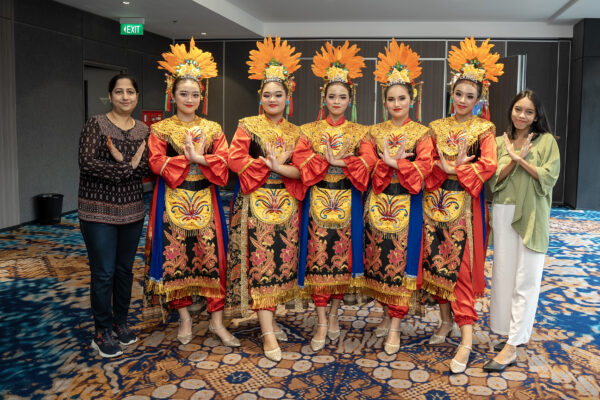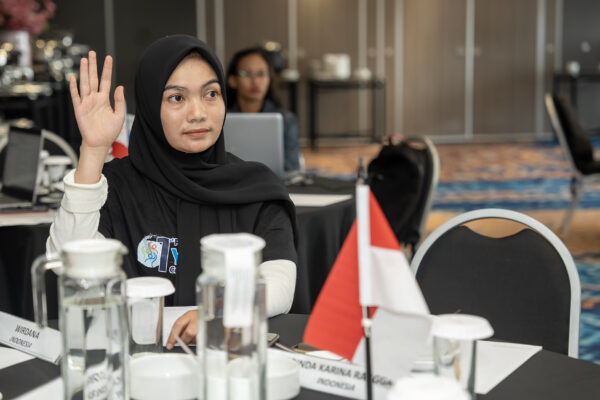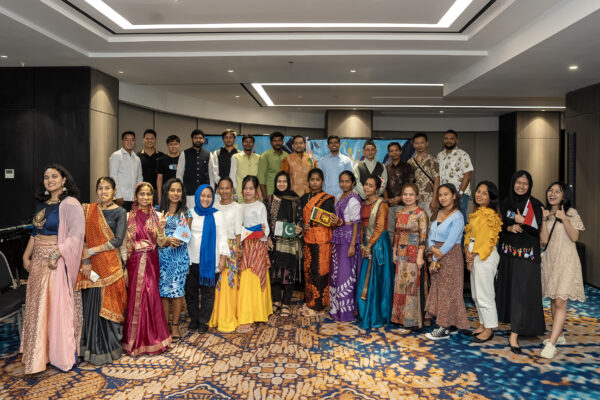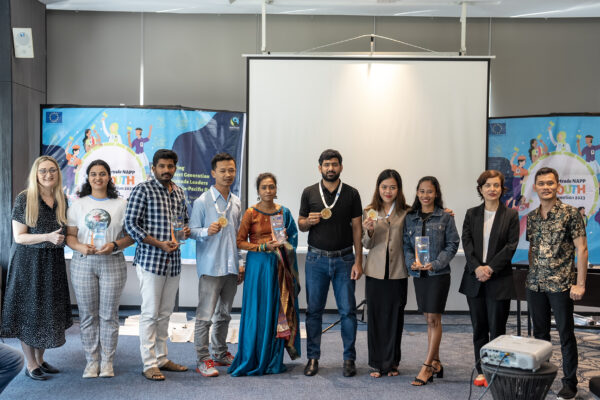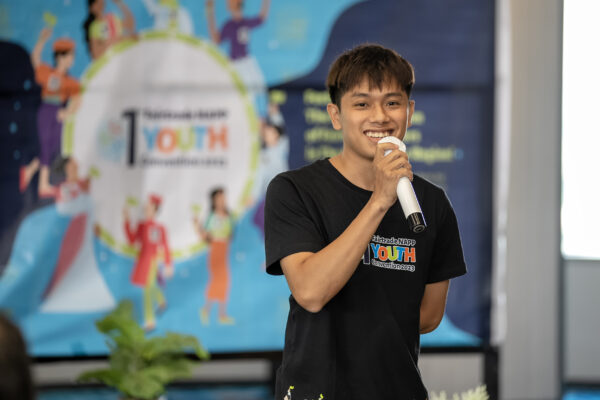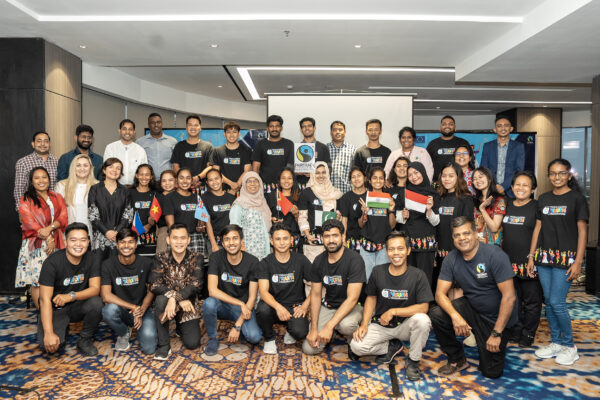Agricultural farming, a vital source of employment in rural areas, presents challenges for the new generation of young leaders. Given the existing challenges to bring opportunities for economic growth and development, the energy, commitment, and knowledge of young leaders can be harnessed to bring new prospects for individuals, communities, and societies at large. Youth constitute a significant portion of society, and providing them with opportunities to participate in decision-making, policy advocacy, and quality education is crucial for achieving sustainability in the food chain and holistic development.
 The Fairtrade Network of Asia Pacific Producers (NAPP) in collaboration with Fairtrade International organized the ‘1st NAPP Regional Youth Convention’ to promote youth inclusion and participation in Fairtrade-certified producer organizations. Supported by the European Commission’s Framework Partnership Agreement Project (EC FPA), the convention brought together over 40 young Fairtrade leaders representing eight countries and seven major agricultural products from the Asia-Pacific region. External experts from international organizations and development practitioners were also present to address the critical challenges faced by young people in rural communities.
The Fairtrade Network of Asia Pacific Producers (NAPP) in collaboration with Fairtrade International organized the ‘1st NAPP Regional Youth Convention’ to promote youth inclusion and participation in Fairtrade-certified producer organizations. Supported by the European Commission’s Framework Partnership Agreement Project (EC FPA), the convention brought together over 40 young Fairtrade leaders representing eight countries and seven major agricultural products from the Asia-Pacific region. External experts from international organizations and development practitioners were also present to address the critical challenges faced by young people in rural communities.
Specific objectives of the 1st Youth NAPP Convention are rooted in the following:
- Connect and engage: it aimed to connect and engage with young leaders, experts, and practitioners from various sectors in the Asia-Pacific region to foster partnerships and motivation.
- Learn and develop skills: It aimed to facilitate learning and skill development by providing access to new tools, knowledge, training, and resources for youth-led projects at the producer level.
- Take action and create impact: It aimed to encourage participants to take action, co-create solutions, and engage in new initiatives and opportunities that would accelerate their impact within their communities.
Keeping in alignment with NAPP Regional strategy 2021-2025, this convention served as an empowering platform for young leaders to share experiences, gain inspiration from experts, and acquire new knowledge and skills that can be applied in their local communities for empowerment and development. The outcomes translated into action-based projects and initiatives have been supported by Fairtrade NAPP and co-funded by the European Union. Hence, it facilitated a powerful cross-sector and cross-national network, connecting the next generation of Fairtrade leaders.

Sanjeet Singh Khurana, Executive Director of NAPP, inaugurated the convention by emphasizing the need for youth commitment and collaboration to address challenges, focusing on achieving the SDGs. The “Youth of Today and Their Role in Agri-Business Sector” panel discussion featured expert speakers who shared insights and experiences that emphasized the importance of involving youth in agri-business, promoting local and global agricultural products, and overcoming challenges through collaboration, education, and skill-building to ensure a sustainable future in agriculture.
The group discussion on country strategies highlighted insights from different countries while acknowledging cultural differences influenced existing strategies. Participants shared experiences, with examples including entrepreneurship focus in Pakistan, emulating marketing strategies in Fiji, engaging youth through activities in Indonesia-Java, and coffee competitions in Vietnam. India emphasized uniting Small Producer Organizations (SPOs) with farmers, while Timor Leste stressed the need to improve youth skills. Gender dynamics and women’s leadership were discussed, including the establishment of a girls’ school in Sri Lanka. Overall, the discussion provided insights into challenges and opportunities in agriculture, emphasizing skill-building, value addition, collaboration, and digital promotion for global competitiveness.
The NAPP Regional Youth Initiatives presentation was then presented by Amit Das to focus on country strategies, key issues, initiatives, and learning outcomes. While India emphasized youth-inclusive monitoring and the Youth Knowledge Hub, Sri Lanka highlighted youth leadership and Fairtrade plantation programs. Natasha Erika presented on promoting youth participation in South East Asia, Pakistan, and Iran while addressing challenges like limited knowledge access and negative perceptions of agriculture’s profitability. Initiatives in Pakistan, Vietnam, Indonesia, Thailand, and the Philippines were discussed, emphasizing training, leadership development, and advocacy. The presentations emphasized empowering youth, skill-building, involvement in decision-making, positive impact, and cooperation in the agricultural sector.
 Strategic presentations were presented regarding the objectives, youth participation and challenges in seven countries. In Indonesia (Java), the focus is on increasing youth participation in Fairtrade SPOs through capacity building and advocacy training. In Indonesia (Sumatra), motivating and engaging young farmers is crucial due to the ageing farming population in coffee farming. India aims to raise awareness about Fairtrade products, address agriculture-related challenges, and promote skill development and climate change mitigation. The Philippines proposes a youth strategy to empower rural youth in the coconut industry through organizational development and resource mobilization. Sri Lanka aims to expand market reach and foster innovation in the Fairtrade sector. Pakistan promotes youth engagement, addressing gender disparities and climate change adaptation. Vietnam prioritizes sustainability and involves youth in decision-making, with initiatives like solar energy integration in agricultural cooperatives. These initiatives emphasize the importance of youth involvement and sustainable practices in fostering a vibrant Fairtrade sector in the Asia-Pacific region.
Strategic presentations were presented regarding the objectives, youth participation and challenges in seven countries. In Indonesia (Java), the focus is on increasing youth participation in Fairtrade SPOs through capacity building and advocacy training. In Indonesia (Sumatra), motivating and engaging young farmers is crucial due to the ageing farming population in coffee farming. India aims to raise awareness about Fairtrade products, address agriculture-related challenges, and promote skill development and climate change mitigation. The Philippines proposes a youth strategy to empower rural youth in the coconut industry through organizational development and resource mobilization. Sri Lanka aims to expand market reach and foster innovation in the Fairtrade sector. Pakistan promotes youth engagement, addressing gender disparities and climate change adaptation. Vietnam prioritizes sustainability and involves youth in decision-making, with initiatives like solar energy integration in agricultural cooperatives. These initiatives emphasize the importance of youth involvement and sustainable practices in fostering a vibrant Fairtrade sector in the Asia-Pacific region.
Based on various points discussed, the next event was conducted to discuss the development framework for NAPP youth programs and priorities for the coming years. The NAPP Youth Strategy’s top priorities were determined by participants’ votes that reflected the crucial areas of focus. These priorities include climate change and mitigation, youth participation and youth involvement, technology and digitalization, capacity building and skill development and sustainable farming. These priorities will guide the NAPP Youth Strategy towards a sustainable and inclusive agricultural future.
A youth charter framework discussion was then conducted to understand the terminologies, the importance of youth participation and a purposed deadline for implementing the plans prepared ahead. Each participant was then assembled into three groups based on the region they belong to discuss the solutions for each region in groups. Each group presented the targets, strategies and roadmaps for each region to overcome specific challenges like climate change, limited capital, and market access. The discussions emphasized the importance of innovative approaches to attract and involve young individuals in cooperatives. By providing support, knowledge, and opportunities, cooperatives can tap into the youth’s potential to drive positive change and sustainable development.
 Empowering youth is vital for addressing broader challenges in the agricultural industry that leads to the growth and success of the economy. South Asia, Southeast Asia, and the Pacific have the potential for the crucial role of youth in shaping a sustainable future and have developed regional initiatives to engage and empower them in the agricultural sector. South Asia aims to attract youth to climate change initiatives and promote skill development, while Southeast Asia focuses on creating prosperous and empowered youth leaders in climate action. The Pacific region aims to involve more youth in agriculture and empower them through sustainable practices. The NAPP Youth Strategy was finalized for the year 2023-26 based on discussions involving youth in the decision-making process for priorities related to:-
Empowering youth is vital for addressing broader challenges in the agricultural industry that leads to the growth and success of the economy. South Asia, Southeast Asia, and the Pacific have the potential for the crucial role of youth in shaping a sustainable future and have developed regional initiatives to engage and empower them in the agricultural sector. South Asia aims to attract youth to climate change initiatives and promote skill development, while Southeast Asia focuses on creating prosperous and empowered youth leaders in climate action. The Pacific region aims to involve more youth in agriculture and empower them through sustainable practices. The NAPP Youth Strategy was finalized for the year 2023-26 based on discussions involving youth in the decision-making process for priorities related to:-
- Climate Change & Mitigation.
- Youth Participation & Youth Involvement.
- Technology & Digitalization.
- Capacity Building & Skill Development.
- Sustainable Farming.
By involving young leaders, the regions strive for a sustainable and inclusive future led by the next generation through regional initiatives. The plan of action has been thus framed to be implemented at the country level and the NAPP level. The plan of action has been framed to be implemented at the country level and the NAPP level.
- At the country level, each country will review and revise its individual strategies to be submitted by the end of June 2023. The NAPP country/regional leads will ensure that all programs align with the requirements outlined in the youth strategy of each country. Starting in 2024, budget allocations for youth programs will be incorporated into the plans of the NAPP leads.
- At the NAPP level, the top priorities identified in the youth strategy will be refined and a final document will be submitted by December 2023. This document will serve as a comprehensive guide for implementing youth-focused initiatives across the region. Additionally, budget projections for centralized programs based on the NAPP youth strategy will be developed, starting from the 2024 budget.
By establishing a coordinated approach at both the country and NAPP levels, this plan of action ensures that the strategies are aligned and that budgetary considerations are taken into account. It provides a framework for the effective implementation of youth programs, allowing for a focused and impactful approach to addressing the priorities identified in the youth strategy. The overwhelmingly positive feedback showcased the enthusiasm and commitment of young leaders to actively shape a sustainable and equitable world. The success of the 1st Youth Fairtrade NAPP Convention serves as a testament to the power of youth engagement and sets the foundation for continued collaboration and progress towards a more just and equitable world. The 1st Youth Fairtrade NAPP Convention has opened new doors for young leaders as it is essential to continue supporting and empowering youth, recognizing their voices, and providing them with the necessary resources and opportunities for a better future.
Inspiring youth stories:
- In Indonesia, the Nira Kamukten Cooperative was established in 2013 by farmers’ children to improve their economic conditions. With initial support from NGOs, the cooperative started with 22 youths who aimed to create a sustainable business model. Despite lacking capital, they encouraged farmers to save and used the savings to buy sugar from them. In 2014, it received an award as one of the best Cooperatives award from the British ambassador in addition to 100 million for capital and buying kitchen equipment and repairs, the chairman of the cooperative also became an ambassador. The cooperative thereafter gained the trust of more farmers and finally joined Fairtrade with certification in 2020. They have expanded their operations today with the help of Fairtrade such as the support received to plant early maturing coconuts in order to attract youth due to its hereditary business.
- In Fiji, Mohammed chose farming and goat raising as a profitable and independent business that provides him with financial and mental freedom to apply his own authority over the business.
- In Sri Lanka, Darshini shared how Fairtrade has transformed her life, providing access to education, training, and improved living conditions. With the help of Fairtrade premium received, they have established a Child Development Center at their Preschool, a school bus for travelling to school, a library update and obtained a training program promoted by the employees of Fairtrade. She plans to educate others and increase youth membership.
These inspiring stories highlight the impact of Fairtrade in empowering youth and improving livelihoods!!



